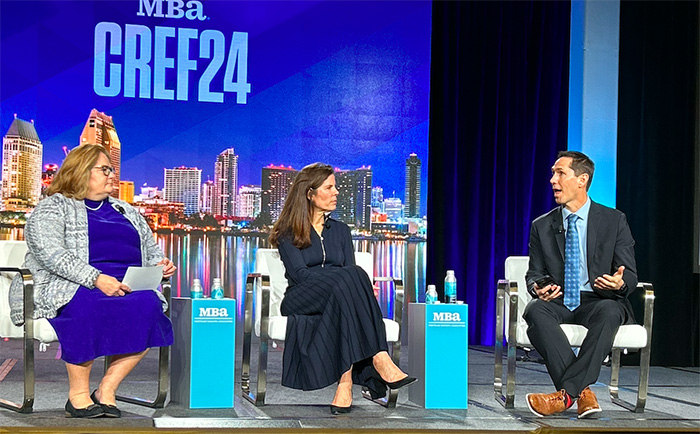
Fannie Mae, Freddie Mac Multifamily Officials: Workforce Housing, Property Conditions Key Issues–#MBACREF24

(From left: Moderator Christine Chandler, 2024 MBA Vice-Chair; Michele Evans and Kevin Palmer; Image by Anneliese Mahoney)
SAN DIEGO–The environment remains challenging but issues such as workforce housing, renter protections and property conditions and insurance are prime topics for Freddie Mac and Fannie Mae, officials from each said during a Feb. 13 session at the MBA Commercial/Multifamily Finance Convention and Expo.
Kevin Palmer, Senior Vice President and Head of Multifamily for Freddie Mac, pointed to workforce housing as one of his enterprise’s top priorities for 2024.
He said there have been an increase in commitments on the issue in 2024, citing as an example the Workforce Housing Preservation Program.
“This is where sponsors agreed to set aside a certain portion of their units, and keep them affordable for a period of time…basically for the whole duration of that loan,” Palmer explained. “And by doing so we kind of lean in from a pricing and credit perspective, and it really helps to support the liquidity in that important space.”
Michele Evans, Executive Vice President and Head of Multifamily, Fannie Mae Multifamily, outlined her enterprise’s actions on workforce housing, pointing to a recently introduced product called Sponsor-Dedicated Workforce, with a running rent restriction instead of income restrictions.
“So we’re excited about that product, because we think that by pulling out some of the income compliance piece of that, it makes it easier for the industry to embrace,” Evans said. “The ultimate goal is to think about ways that we can manufacture portability in our programs that we have.”
As for tenant protections–another currently much-discussed topic in the industry–Palmer said Freddie Mac is looking for ways “in which beyond just affordability that we can help create good decent safe housing, that families can be proud of and that helps to advance them individually and economically.”
For example, he highlighted the Impact Sponsor program, which involves sponsors that add various programs and community-building efforts to their properties.
Palmer also emphasized a need to further collect data and study tenant protection issues, with a particular interest in tenant notification protections.
Evans agreed on the point of information, pointing to recent surveys on tenant protections, and the need to figure out and address challenges tenants are having, such as with the complexity of some leases.
Fannie Mae has also worked on a pilot program related to Housing Choice Vouchers; Evans said it’s in the process of rolling that out nationwide.
Property conditions are also a concern in 2024. Palmer said Freddie Mac collected significant feedback on how to address property condition issues in 2023, leading to an adjustment of policies.
“In general, it’s kind of heightened due diligence and surveillance,” Palmer said. “Key there is if issues are identified–if life safety issues are identified–that we’re notified immediately, that we’re working collectively to be able to address these issues very, very timely.”
Evans said Fannie Mae has also put additional safety measures in place to make sure property conditions are being managed appropriately.
As for the conversations surrounding property insurance, Palmer and Evans emphasized that the properties their entities finance do need property insurance.
While Palmer said he doesn’t expect to see “sweeping changes” in terms of policies, “on a case-by-case basis, we’ve worked to understand what the availability of insurance is in this specific area, and how we might make some small adjustments to our policies or kind of making certain exceptions.”
Evans said that Fannie Mae has spending time with lenders, making sure that the right insurance is in place before a transaction is closed.
Both expressed optimism on the issue. “Whenever you see challenges like this, I think there’s a great opportunity for the entire industry to get together, and really kind of take a look at it and see what we have, and what we can do, and how we can think about it,” Evans said.
